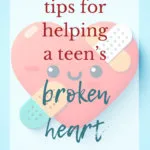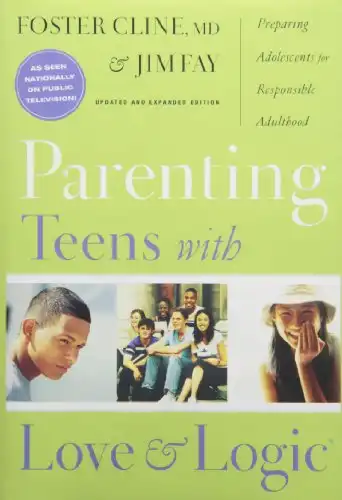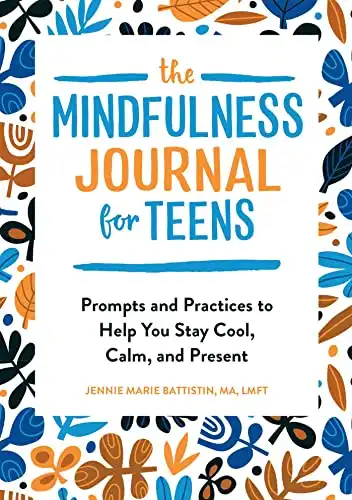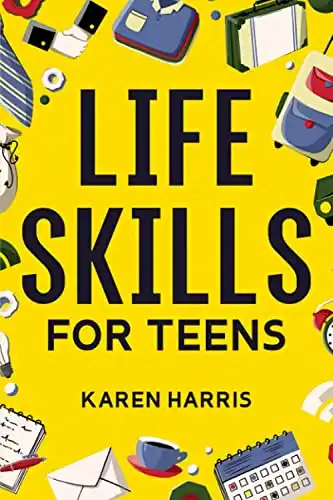Parenting through the teenage years can be filled with ups and downs, right?
One of the heart-wrenching dips is watching them handle teenage breakups.
Supporting your teen through this emotional rollercoaster is crucial for their well-being and growth.
It’s tough, but fear not – I’ve got your back with some practical tips on how to help your teen navigate the complexities of a broken heart while fostering resilience and emotional intelligence along the way.
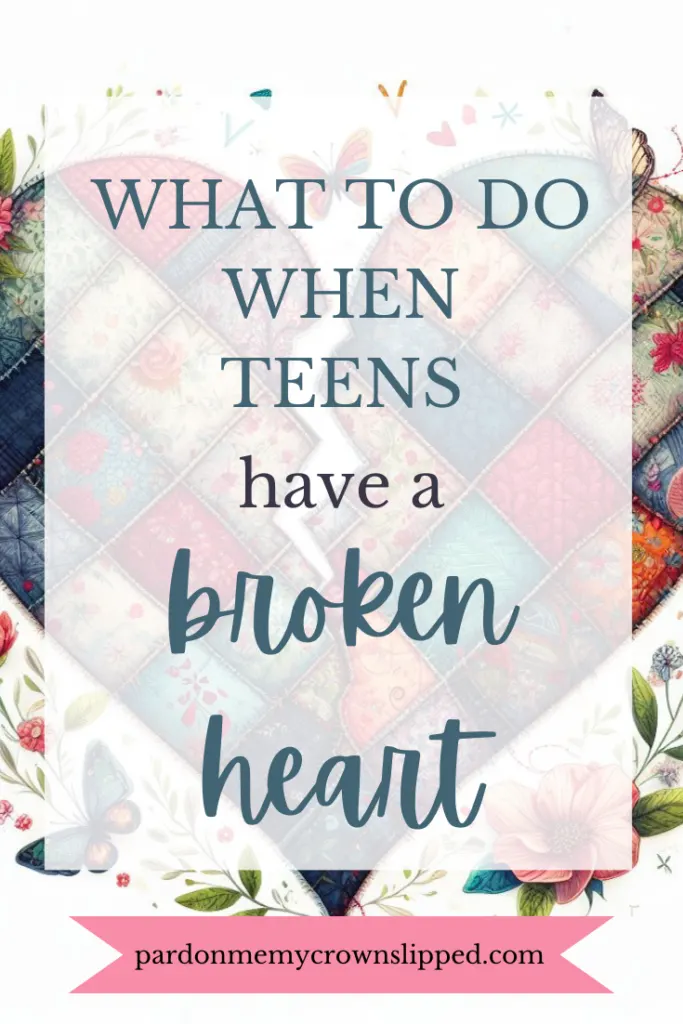
This post contains affiliate links. I will earn a commission at no additional charge to you if you make a purchase using my links. Click here to see my full disclosure policy.
Understanding the Teenage Heart
Adolescence is a time of intense emotions and self-discovery. Romantic relationships play a significant role in a teen’s journey toward understanding themselves and their place in the world.
When a relationship ends, the emotional impact can be profound, affecting their self-esteem, mood, and overall mental well-being.
Recognizing Signs of Heartbreak

Heartbreak isn’t limited to romantic relationships; it can also affect teenagers in various aspects of their lives. Understanding the signs is crucial for providing support and intervention when needed.
Emotional Withdrawal
Teens experiencing heartbreak may withdraw emotionally, creating a sense of isolation. They might spend more time alone, distancing themselves from friends and family.
It’s essential to approach them with empathy, creating a safe space for them to share their feelings. Encouraging open communication can help rebuild the connection that emotional withdrawal often disrupts.
Changes in Sleep Patterns
Heartbreak can disrupt a teenager’s sleep patterns, leading to either insomnia or excessive sleeping.
Insomnia may be a result of racing thoughts and emotional turmoil while oversleeping might be an attempt to escape the pain.
Establishing healthy sleep routines and encouraging a relaxing bedtime environment can contribute to better sleep quality during difficult times.
Mood Swings
Mood swings are a common manifestation of heartbreak. Teens may oscillate between intense sadness, anger, and moments of apathy.
It’s crucial to validate their emotions and let them know that such feelings are normal during challenging times.
Providing outlets for self-expression, such as journaling or talking to a trusted friend or counselor, can help them navigate and process their emotions effectively.
Academic Decline
Heartbreak can significantly impact a teenager’s academic performance. A sudden decline in grades might be indicative of emotional distress.
Teachers and parents should be attentive to changes in behavior and performance, offering additional support and understanding during this challenging period.
Collaborating with school counselors can help create a supportive academic environment that acknowledges the emotional well-being of the teenager.
Is Your Teenager Getting Enough Sleep? Simple Tips You Need Today
10 Ways To Help a Teenager with Anxiety Today
5 Shockingly Simple Ways On How To Improve Tween Attitude Right Now
Initiating Open Conversations

Create a Safe Space
Open communication is the cornerstone of effective support. Create a safe space for your teen to express their feelings without fear of judgment. Encourage them to share their emotions, thoughts, and concerns at their own pace.
Active Listening
Listen actively and empathetically. Avoid offering immediate solutions; instead, validate their emotions. Phrases like “I understand this is really hard for you” convey empathy and support.
Ask Open-ended Questions
Encourage dialogue by asking open-ended questions. For example, “Can you tell me more about what you’re feeling?” or “What do you think might help you feel better?”
3 Easy Ways on How to Connect with Your Tween (or teen)
Navigating the Healing Process

After experiencing heartbreak, the healing process is crucial for a teenager’s emotional well-being. Navigating this journey involves encouraging constructive outlets and fostering a supportive environment.
Encourage Self-Expression
Journaling
Suggest keeping a journal to express their thoughts and emotions.
Writing allows them to reflect on their feelings, track their progress, and gain insights into their healing journey. It’s a private and personal space where they can explore their emotions without judgment.
Artistic Outlets
Engaging in artistic pursuits such as drawing, music, or writing offers an alternative means of self-expression.
These outlets can serve as powerful tools for processing complex emotions.
Encouraging teens to explore their creative side not only provides an emotional release but also fosters a sense of accomplishment and self-discovery.
Physical Activity
Regular exercise is a well-documented aid to mental health. Activities like jogging, yoga, or team sports can offer a healthy distraction from emotional distress.
Physical activity releases endorphins, which can elevate mood and reduce stress.
Encouraging teens to find an activity they enjoy not only contributes to their overall well-being but also promotes a positive mindset.
Best Reason to Exercise for Teens and Tweens
Social Connection
Friendship Support
Encouraging interactions with friends who provide a positive and supportive environment is vital during the healing process.
True friends can offer a listening ear, share experiences, and provide comfort.
Creating opportunities for teens to spend time with friends who understand and empathize with their feelings can significantly contribute to the healing journey.
Volunteer Work
Engaging in volunteer work provides a sense of purpose and connection to a community.
Encouraging teens to contribute their time and energy to a cause they care about can shift their focus from personal pain to making a positive impact on others.
This not only helps in healing but also fosters a sense of accomplishment and resilience.
37 Volunteer Opportunities for Teenagers to Get Involved Today
Modeling Healthy Coping Strategies

Teens often emulate the coping strategies they observe. Modeling healthy behaviors during difficult times sets a positive example.
Express Your Emotions
Demonstrate that it’s okay to express emotions. Share your experiences of overcoming challenges and how you coped with heartbreak during your own adolescence.
Maintain Healthy Relationships
Model healthy relationship dynamics in your own life. Emphasize the importance of communication, mutual respect, and personal growth within relationships.
Self-Care Practices
Prioritize self-care and stress the significance of taking care of one’s mental and emotional well-being. This includes getting adequate rest, practicing mindfulness, and seeking support when needed.
5 Key Habits That Affect Attitude
5 Easy Relaxation Techniques for Teens and Tweens To Try Today
While I wrote this post with adults in mind, it has some good coping skill techniques:
When to Seek Professional Help
While most teens recover from heartbreak with time and support, some may struggle more than others. Be vigilant for signs of prolonged distress, such as persistent sadness, drastic changes in behavior, or thoughts of self-harm.
Professional Counseling
If necessary, consider seeking the help of a professional counselor or therapist. Therapy provides a confidential space for teens to explore their emotions and develop coping strategies.
Final Thoughts On Teenage Breakups
Supporting your teen through heartbreak requires patience, empathy, and a commitment to fostering their emotional resilience.
By maintaining open communication, encouraging healthy coping strategies, and modeling positive behaviors, you play a pivotal role in helping your teen navigate the complexities of relationships and emerge stronger on the other side.
Remember, the journey toward healing is unique for each individual, and your unwavering support can make all the difference in their emotional well-being and personal growth.



